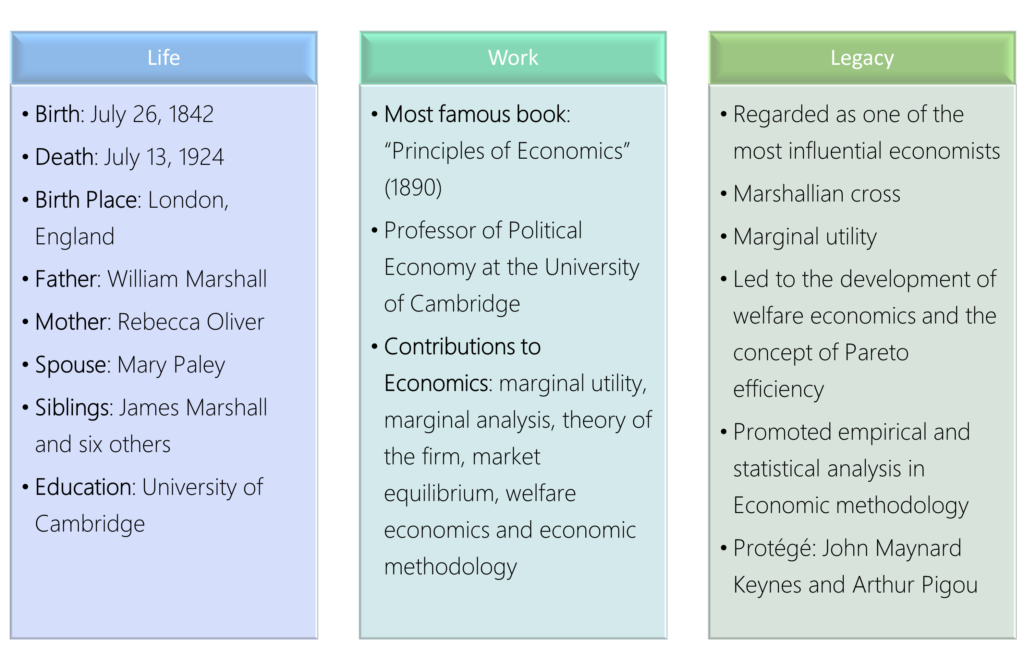Alfred Marshall (1842-1924) was a British Economist. He was one of the most influential figures in the development of modern microeconomics. His ideas in the famous book “Principles of Economics” are considered a landmark in economic theory and are widely read and studied even today. Marshall introduced the important concept of Marginal Utility which became a cornerstone in modern economic theory.

Econometrics Tutorials with Certificates
The life of Alfred marshall
Family and Background
Alfred Marshall was born on July 26, 1842, in London, England. He was the son of a bank cashier William Marshall and his mother, Rebecca Oliver, was the daughter of a prosperous solicitor. Marshall was the eldest of eight children. His family valued education and encouraged their children to pursue intellectual interests.
Marshall showed an early aptitude for mathematics and science. He attended the University of Cambridge, where he studied mathematics and philosophy. However, he became interested in economics after attending lectures by Henry Fawcett, a prominent economist and member of parliament. Marshall later became a student of Fawcett and was heavily influenced by his mentor’s ideas.
Marshall married Mary Paley, a prominent feminist and the daughter of a fellow Cambridge professor, in 1877. Marshall’s younger brother, James Marshall, was also an economist and a close collaborator of his brother. They co-wrote several articles and books together. Marshall also provided financial support to his younger siblings, including paying for their education. And, he helped them establish themselves in their careers.
In addition to his work as an economist, Marshall was also a dedicated teacher. He was a professor of political economy at the University of Cambridge from 1885 until his retirement in 1908. Many of his students went on to become prominent economists in their own right, including John Maynard Keynes, one of the most famous economists of the 20th century.
Marshall died on July 13, 1924, in Cambridge, England, at the age of 81. He is widely regarded as one of the most important economists of the 19th and early 20th centuries
Occupations
Alfred Marshall held a number of occupations during his lifetime, including:
- Tutor: Marshall worked as a private tutor before he began his academic career. He taught mathematics and economics to young students.
- Examiner: Marshall served as an examiner for the Indian Civil Service from 1870 to 1877 which involved evaluating candidates for administrative positions in India.
- University lecturer: He was appointed as a lecturer in economics at the University of Cambridge in 1885, and he taught there until his retirement in 1908. He was later appointed as a professor of political economy, a position he held until his retirement.
- Economist: Alfred Marshall is best known for his work as an economist because he made significant contributions to the field of microeconomics. He wrote numerous articles and books on economic theory and policy.
- Government adviser: Marshall was called upon to advise the British government on economic matters, particularly during World War 1. He was a vocal advocate of free trade and opposed government intervention in the economy.
- Editor: Marshall served as the editor of the Economic Journal from 1890 until his retirement in 1922. The journal was one of the leading academic publications in economics at the time and Marshall played an important role in shaping its content.
Major Publications
Alfred Marshall was a prolific writer who published a number of books, papers and articles. Some of his most important publications were:
- “The Pure Theory of Foreign Trade” (1879): this was Marshall’s first major publication, in which he developed his ideas on international trade and comparative advantage.
- “The Economics of Industry” (1879, co-authored with his brother James Marshall): A comprehensive overview of the theory of supply and demand and its application to different industries.
- “Principles of Economics” (1890) – this was Marshall’s most famous work, in which he presented his ideas on marginal utility and the theory of the firm.
- “Industry and Trade” (1919) – A collection of Marshall’s essays on economics and public policy, including his thoughts on industrial organization and government regulation.
- “Money, Credit, and Commerce” (1923) – A collection of Marshall’s lectures on monetary theory and the role of banks and financial institutions in the economy.
- “Official Papers” (1926) – A posthumous collection of Marshall’s papers on economic policy, including his views on taxation, international trade, and government intervention in the economy.
- “Memories of Alfred Marshall” (1925, edited by A.C. Pigou) – A collection of reminiscences and tributes to Marshall from his colleagues and former students.
Major Ideas and contributions by Alfred Marshall
Alfred Marshall made significant contributions and advancements in economic theory, especially microeconomics. Some of his most important ideas were:
Marginal Analysis
Alfred Marshall introduced the concept of marginal utility. Marginal utility refers to the additional satisfaction that a consumer receives from consuming one more unit of a good or service. He argued that consumers make decisions based on the marginal utility rather than the total utility. Similarly, producers make decisions based on marginal cost and marginal revenue. This idea introduced a new dimension to microeconomic theory and led to the development of the law of diminishing marginal utility. This law states that the marginal utility of a good or service declines as more of it is consumed. It is one of the most widely used concepts in economics.
The Theory of the Firm
Marshall’s theory of the firm emphasized the role of production costs and revenue in determining a firm’s behaviour. He argued that firms or producers seek to maximize profits. They achieve this by producing at the point where marginal cost equals marginal revenue. This led to the development of the concept of the “firm’s supply curve,” which shows how the quantity of a good or service that a firm is willing to supply depends on the price.
Market Equilibrium
Marshall contributed to the development of the theory of market equilibrium. It describes how supply and demand interact to determine prices and quantities in a market. He argued that markets tend to move towards equilibrium, where the quantity supplied equals the quantity demanded, and that prices adjust to clear the market. He also introduced the concept of price elasticity of demand. Price elasticity helps measure the responsiveness of consumers and the quantity demanded by them due to changes in price.
International Trade
Marshall developed a theory of international trade based on the comparative advantage which was introduced by David Ricardo. He argued that countries should specialize in producing the goods and services they can produce most efficiently. And, they should trade with other countries to obtain goods and services they cannot produce as efficiently. This led to the development of the idea of “gains from trade”. He advocated that all countries can benefit from trade, even if they are not as efficient as other countries in producing certain goods and services.
Welfare Economics
Alfred Marshall was highly concerned with the welfare of society as a whole. He developed a framework for evaluating economic policies based on their impact on social welfare. He argued that policies that increase total welfare, or the sum of consumer and producer surplus, are desirable. This led to the development of the idea of “Pareto efficiency” later. Pareto efficiency refers to a state where no one can be made better off without making someone else worse off.
Contributions to Economic Methodology
Marshall was instrumental in bringing about changes in the methods and techniques of economic analysis. He developed a methodology for studying economic phenomena that emphasized the use of empirical data and statistical analysis. He further argued that economics should be based on observation and experimentation, and that mathematical models could be used to test economic theories.
legacy
Alfred Marshall’s legacy in economics is significant, and his ideas and theories have had a lasting impact on the field. Firstly, his emphasis on marginal analysis and the role of production costs and revenue in determining a firm’s behaviour laid the foundation for modern microeconomic theory. His ideas on consumer behaviour, supply and demand, and market equilibrium continue to be central to the study of microeconomics.
Secondly, Marshall’s emphasis on empirical research and statistical analysis helped establish economics as a rigorous and scientific discipline. His famous graphical representation of supply and demand is known as the Marshallian Cross. It still remains an important tool for understanding the interaction of supply and demand in a market.
In addition to being an economist, Marshall was also a prominent teacher. He inspired and influenced a generation of economists through his mentorship. Some of his famous proteges include John Maynard Keynes and Arthur Pigou. You can also find some of his famous quotes here.
Keynes was one of the most influential economists of the 20th century, and he studied under Marshall at Cambridge University. Furthermore, Keynes was deeply influenced by Marshall’s emphasis on empirical analysis and his focus on the role of institutions in shaping economic outcomes. Pigou was a British economist who also studied under Marshall at Cambridge University. He was known for his work on welfare economics and the concept of externalities. Moreover, he also made important contributions to the study of public finance.
Econometrics Tutorials with Certificates
This website contains affiliate links. When you make a purchase through these links, we may earn a commission at no additional cost to you.


